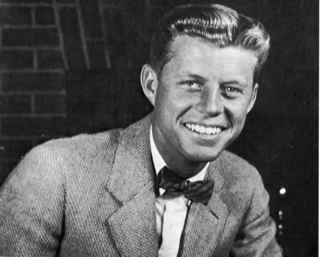Harvard

Jack Kennedy
Jack spent most of his first semester in college at Princeton. He was unhappy there and became quite sick. Then, he transferred to Harvard University, which he began in September 1936. In his first year at Harvard, Jack received mostly "C's". At the end of his freshman year he spent the summer touring Europe. His grades improved during his sophomore year, and he moved into an exclusive eating club . With the situation deteriorating in Europe and his father serving as Ambassador to England, JFK received permission to study in Europe during the second semester of the junior year. Jack was in Europe when the war began. On his return to Harvard, he wanted people to know that he supported the British and their decision to enter the war . He wrote his senior thesis (a very long research paper) on why England failed to prepare for war..
After graduating from Choate, Jack applied to both Princeton and Harvard. He wanted to go to Princeton, rather than Harvard, to join his best friend Lem Billings. Attending Princeton would also allow Jack to emerge from the shadow of his brother, Joe.However his father had other plans. He thought Jack should go to London, as his brother had before him, and study at the London School of Economics.Jack went along with the idea. In London, however, Jack was hospitalized once again.After recovering, he decided that London was not for him. He returned to the United States to attend Princeton. Many of his friends were going to Princeton, and that was a major plus for Jack.Unfortunately, that was about the only thing he liked about being in Princeton. Ultimately, his dislike for the university was irrelevant, because by December Jack was again sick. He was hospitalized for over two months. Jack then went to the Southwest to convalesce and spent the rest of that academic year recovering. It was at this point that Jack decided to transfer to Harvard.
Jack enjoyed his first year at Harvard.Most important, he was finally healthy. Soon, Jack had developed a rather active social life and acquired a reputation as a bit of a playboy. He did not put a great deal of effort into his schoolwork. As a result,his grades were Bs and Cs.
After his freshman year, he and Lem Billing set off for a tour of Europe.They took Kennedy's car along with them and travelled extensively, starting in France, where they explored Paris at length.Then they headed toward the French countryside.Jack very much wanted to visit Spain, but the raging civil war made such a visit impossible. But they did go as far as the border and met with some of the many refugees.Jack tried to sort out the issues of the civil war in his mind. Later, he wrote to his father that he was disappointed by "how little Americans understood the war" and that while he thought it might be better for Spain if Franco won, the Republicans were in the moral right. He went on to say, "Peoples' financial status seems to form their political opinions. Even the newspapermen, at least the foreign ones, are all prejudiced, due to the peculiar position of the press in Europe, they [the newspapers] are party instruments over here. "
Next, Kennedy and Billing went to Italy, where both were impressed by what they saw there. It seemed much cleaner an organized then France. They were also impressed, with the Italian girls they met. From Italy they headed north to Germany.There, they felt distinctly uncomfortable with the regimentation of German society and with the German people.Jack noted in his diary that the visit: 'started out as usual, except this time we had the added attraction of being spitten on.
From Germany, they traveled to England, where Jack again succumbed to one of his periodic illnesses. After Jack's recovery, the young men traveled to Scotland and spent some time with Sir James Calder at his estate. After that stay, it was back to the United States. The trip to Europe clearly solidified Jack's interests in and concern for foreign affairs.
In his second year at Harvard, Jack's major accomplishment was to join the 'spee club", one of the more exclusive groups on campus. He also played on the Junior Varsity football team" until a back injury ended his playing career. During his sophomore year Jack worked hard, and played hard. But once again, his health problems interfered. He was hospitalized twice and continued to suffer from mysterious weight losses.
During that school year (1937-1938) Kennedy's father was appointed American Ambassador to the Court of St. James (Great Britain). That summer, Jack accompanied his father to England. He had traveled to Europe the previous year, more or less incognito; he had been just another student. Now, he was traveling as the son of an important Ambassador.
Jack was a social success in London and solidified his reputation as a ladies" man. He made friends easily and enjoyed himself. But he also had a chance to witness, first hand, the crisis that led to the Munich appeasement. (See the entry on Jack's trip to Europe).
On his return to school, Jack took renewed interest in his courses. He worked particularly hard, because he had requested academic leave to spend the spring in London. Aware of events unfolding in Europe, he worked hard on his senior thesis.But his new studiousness did not take away from his new romance (likely his first serious one), with Frances Ann Cannon, a romance that flourished until his departure to Europe on February 24, 1939.
 >
>